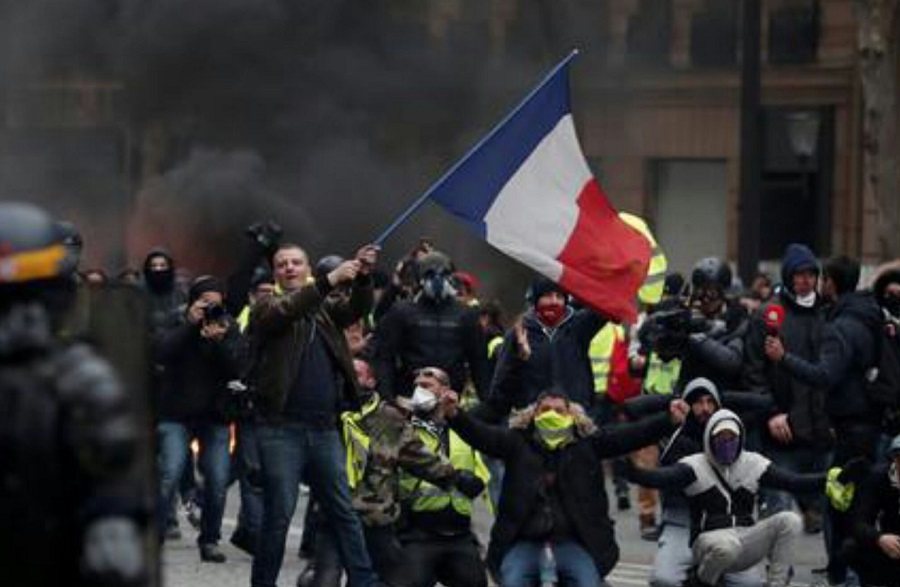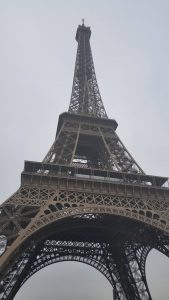
A fourth weekend of violent riots continued in Paris and elsewhere in Europe, with more than 125,000 “yellow vest” protestors taking to the streets against the French government and French President Emmanuel Macron. To conform to the Paris Climate Agreement, France raised taxes on fuel significantly. Because such “carbon taxes” disproportionately hurt poor and low income people, the implementation of the tax served as a trigger to the protest movement. Donning yellow vests that are mandatory for drivers to have in their car for emergencies in France, protesters have come out to riot against not only the latest fuel tax, but the overall lack of concern for poor and low income citizens across a broad range of social issues ranging from minimum wage to healthcare.
Scientists are increasingly moving away from the idea that man-made CO2 is responsible for global warming. Former National Hurricane Center Director Neil Frank says the Paris Climate Agreement is nothing but a “money grab” from the poor to the rich. At the 2018 National Tropical Weather Conference, Frank added, “In 2017, 485 peer reviewed papers said CO2 is not to blame for changing climate conditions; the sun is.” With meteorologists challenging a political narrative with science, many in France and beyond are challenging the value carbon taxes and additional taxes on fossil fuels have on an evolving climate. In Canada, the Liberal government has been thinking about ways to contribute to meeting climate goals. They’ve been working on a carbon pricing plan that would introduce a national minimum price of CAD $20 per ton on emissions in 2019, rising to $50 per ton in 2022. However, pro-science voices have put such fees into question, with protesters and regional leaders, such as Manitoba Premier Brian Pallister, saying they want no part of a climate change tax scheme. The leaders of other Canadian provinces agree, with Saskatchewan and Ontario joining Manitoba to say they don’t want to jump into any new scheme for their citizens.

While protests against such schemes in Canada and the United States have been small and peaceful, the opposite has been true in France. This weekend, more than 1,200 protestors were arrested as protests turned into riots. 71 people were injured, including one man who lost a hand and one woman who lost an eye. French officials deployed 89,000 police officers to control the protests, closing down famed tourist destinations like the Eiffel Tower and the Louvre Museum. Angry protesters ripped off the plywood protecting Parisian store windows and threw flares and other projectiles, damaging closed stores that would usually be bustling with holiday shoppers. While violence was bad this weekend, it wasn’t nearly as bad as it was last week, with much more damage and many more injuries. Last week’s injury count was up to 135 which included 17 police officers.
United States President Trump suggested Saturday dissolving the “ridiculous” Paris climate agreement. “Very sad day and night in Paris,” Mr. Trump tweeted. “Maybe it’s time to end the ridiculous and extremely expensive Paris Agreement and return money back to the people in the form of lower taxes? The U.S. was way ahead of the curve on that and the only major country where emissions went down last year!” This latest Tweet comes after two others made by Trump in recent days about the violence in France. “The Paris Agreement isn’t working out so well for Paris. Protests and riots all over France”, the President Tweeted. “People do not want to pay large sums of money, much to third world countries (that are questionably run), in order to maybe protect the environment. Chanting ‘We Want Trump!’ Love France.”
Earlier today the French government urged President Trump to not interfere in French politics. “We do not take domestic American politics into account and we want that to be reciprocated,’ France’s Foreign Minister Jean-Yves Le Drian told LCI television. “I say this to Donald Trump and the French president says it too: leave our nation be.’
Fresh President Emmanuel Macron has been quiet and and out of the public eye since last weekend’s riots, adding to the anger of the protesters this weekend. While out of public view, Macron, abandoned the fuel tax rise that initially prompted the yellow vest protest movement a month ago. Macron’s move to kill the fuel tax damaged his credibility with climate defenders and foreign investors. Protesters this weekend said the move to kill the fuel tax was “too little, too late”; they now have other demands including taxing the rich, raising the minimum wage, and having Macron hand in his resignation immediately. Macron broke his silence yesterday to Tweet appreciation for the police, but he has yet to say anything official or make any public appearance. A spokesman today said that Macron would address the nation early in the week. The Daily Mail reports that Macron will “deliver an apologetic address on television and announce further tax cuts”; while some want France to exit the Paris Climate Agreement, it is not clear if Macron would consider such a move at this time.